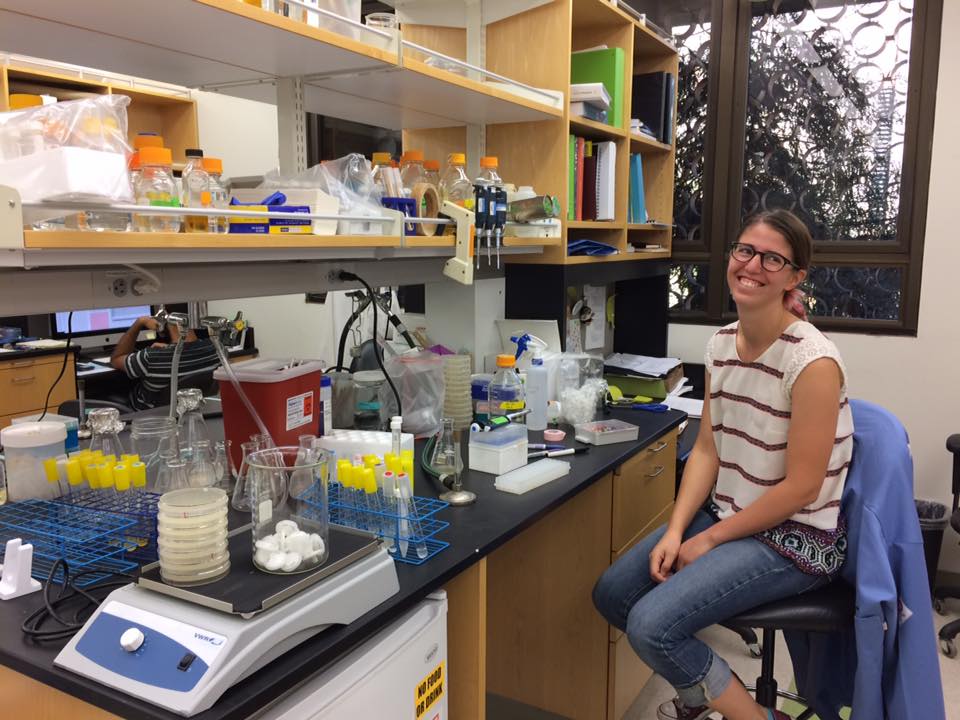
Illustration by Emma Sosa, Graduate Student in GPS, for Caltech Letters
Viewpoint articles are a vehicle for members of the Caltech community to express their opinions on issues surrounding the interface of science and society. The views expressed here do not necessarily reflect the views of Caltech or the editorial board of Caltech Letters. Please see our disclaimer.
At Caltech, there are many opportunities to hear people talk about their science, but we seldom learn about speakers’ career paths beyond the thirty-second introductions listing awards and alma maters. One of the rare chances to hear someone’s full career trajectory is at a series of events hosted by Caltech’s Women in Chemistry group. These wonderfully low-key breakfast events take place in the historic Gates Chemistry Library. I’ve heard many different women share their stories over the space of an hour, yet even these conversations never seem to fully explore their paths. The career paths described sometimes seemed incredibly straightforward: I have loved science since I was five years old, I went to graduate school, and finally, I got my dream job as a professor. They might mention a departure from the typical trajectory or hardships encountered along the way, but these conversations, like the thirty second-introductions, are still a compressed version of the facts.

A photo in the Gates Library after a Women in Chemistry breakfast event with Professor Corrina Hess (seated, white shirt) in 2018. The author is seated on the far right.
Elise Tookmanian
Let me tell you my thirty-second introduction.
I grew up outside of Philadelphia and graduated from high school near the top of my class with a deep love of learning and science. I attended Franklin & Marshall College, a small liberal arts college in Pennsylvania with superb undergraduate research opportunities. After working hard in a lab there for three years, I published two first-author papers and received awards from the Chemistry department. I applied to several schools for graduate school but chose Caltech for its top-tier chemistry department. There, I joined Dianne Newman’s lab to do exciting interdisciplinary research in the field of geobiology. While at Caltech, I became an editor for Caltech Letters and plan to pursue a career in science communication after I graduate.
It sounds nice, right?
It’s all true, but it certainly isn’t the full story. This thirty-second introduction obscures my privileges, my struggles, and even my good luck. These details can easily become invisible because, especially in the United States and in academia, society constantly reinforces the idea that the world functions as a meritocracy. In a meritocracy, wealth, power, and opportunity are distributed to individuals based on talent and effort alone. It’s the tempting idea that race, class, or your family background don’t affect your future, that you can do well in life if you work hard. Meritocracy perpetuates the false beliefs that you can pull yourself up by your bootstraps, that every kindergartener could be President one day, and that SAT or GRE scores are predictive of academic success. The data consistently show the opposite. Race and background play demonstrable roles in measures of success—especially in the context of STEM higher education. With the COVID-19 pandemic, we have seen that even the economic fallout of the pandemic and the virus itself disproportionately affect racial and ethnic minority groups. Meritocracy would have us believe that any of these failures are due to character flaws—laziness or lack of intelligence. In reality, these statistics are the fallout of systemic discrimination that cannot be overcome by determination alone. Meritocracy preserves the status quo of white supremacy, patriarchy, ableism, and class divisions by simply saying that they don’t exist. We’re all just blank slates with the same world of opportunities at our feet.
The story of my life that more accurately accounts for the factors outside my control goes something like this.
I grew up outside Philadelphia in a family of six. We were comfortably middle-class and never worried about necessities. Both of my parents graduated from college, so it was always assumed that we would have the opportunity to do the same. My mom didn’t have to work and chose to homeschool my siblings and me for a few years instead. She gave me a lot of specialized attention as I was learning to read and write, but also the freedom to explore whatever was interesting to me. These experiences fostered my love of learning, reading, and writing. My high school was well-funded and offered many AP classes. Taking these AP classes boosted my GPA and prepared me to take the same courses again in college. When I was accepted to different colleges and received the financial aid packages, I chose a school that was slightly more expensive because it was a good investment. I didn’t have to worry about going into debt. I had my family to fall back on, and I didn’t need to financially support them. Beyond that, I simply assumed that I would be able to get a good job and pay off my student loans without any problems. My background, growing up middle-class with two parents who graduated from college, normalized these assumptions.
As a white woman growing up in a majority white town, I never felt that I didn’t belong. I chose to attend Franklin & Marshall College and later Caltech without a single thought to my race. The note on Caltech’s application encouraging students from underrepresented groups to apply didn’t give me pause. I could choose these schools because I knew I would feel comfortable there. Their reputations as “elite” schools were positive features; I didn’t have to consider that the descriptor is often correlated with whiteness. Even choosing to continue in academia and attend graduate school was a comfortable decision. My whiteness allowed me to move through these white academic spaces easily, never doubting that I belonged there.
Beyond my privileges, I also had some good old-fashioned luck along the way. When I started doing research, I was given a project that turned out to be relatively straightforward. When other students spent weeks trying to get their proteins to crystallize, my protein happened to crystallize on my very first attempt. I published this project with my advisors, and I spent the next year expanding on this work to publish a second paper. I worked hard, but I was also very lucky to be given that specific project in that particular lab.

The author stands in front of her poster titled Development of a Vibrational Hydration Ruler at the 2015 Biophysical Society Meeting.
Elise Tookmanian
This second version of my story is longer. And it accounts for only some of the luck, circumstance, and privileges that got me to Caltech. It is difficult to reconsider my accomplishments in the broader context of my privilege—I can no longer take full credit for my success. However, this version doesn’t negate my hard work or talents or drive. This version simply recognizes that there was more at play in the opportunities that presented themselves and my decision-making along the way.
In the same way that meritocracy gives meaning to our success, it also gives meaning to our failure. When I got to graduate school, meritocracy flipped on its head. What had previously buoyed my belief in my belonging and success now became a source of deep insecurity and shame. My struggles became evidence that I didn’t belong at Caltech or even in graduate school, a reflection of my inadequacy. Within the framework of meritocracy, everything I did reflected my innate worth: my faults, my merits. When the problem is you, how do you escape it? Meritocracy puts all the weight on the individual: both success and failure. If you succeed, it’s because you are talented, but if you fail, it is because you are broken.
These harsh dichotomies are not a fair or truthful way to view ourselves or the world. Outside of meritocracy, there are more realistic ways to understand failure. I failed because science is a place where things should fail most of the time. I failed because I was learning. I failed because I beat myself up for failing, making it harder and harder to try again. I failed because I was struggling with anxiety, a condition that surfaced during grad school and takes a lot of effort to manage. I failed because maybe graduate school wasn’t exactly right for me. Not because I am not smart or talented, but because it wasn’t a good fit. I missed the concrete goals and the opportunities to try new things that I had during my liberal arts college experience, and I learned how much I enjoyed writing and having an impact in my community. No hard feelings. It’s not me, it’s just, well, graduate school.
I say “failed,” but my time in graduate school hasn’t been a failure. “Failed” may be the first word that comes to my mind because meritocracy is hardwired into my very neurons, but it (again) isn’t the truth. I may not have a thesis full of experimental data, but my contributions are still valuable. I’ve learned so much about myself and even discovered what I want to try next. The truth is graduate school was a really hard time for me, and that doesn’t define me as a person.

The author sits in front of her laboratory bench at Caltech in the fall of 2016.
Elise Tookmanian
I try to hold these truths together as a way to bring form to this invisible force in the world. I can be hardworking, benefit from white supremacy, and find it difficult to start working some mornings. This isn’t always an easy task. But, maybe it is getting easier. According to a Pew Center Research report in 2020, 65% of adults in the United States say that some people are rich because they have had more advantages in life, rather than due to hard work. This erosion of the myth of meritocracy gives me hope.
Now, when I listen to the thirty-second introductions before seminars, I try to remember that I’m listening to a story. Stories help us better understand ourselves and our world. Stories simplify and make sense of information. But they undoubtedly lose some complexity in the telling. They are only an approximation of reality. We don’t always have time to get into all the details. Our stories about ourselves or others rely on shorthand and tropes in the same way that a movie or book does. And just as we should critique and analyze the media we consume, I think it is time to critique the stories we tell about ourselves.
By taking into account our privileges and our roadblocks, we can take control of our personal narratives. This empowering act decouples our worth and our “success” or “failure” by reevaluating our efforts within the bigger, more complex landscape that surrounds us. As we take control of our personal narrative, we can fight off our imposter syndrome and extend empathy to those around us. We can change how we read other people’s stories. When hiring a new faculty member, admitting the next class of graduate students, or giving out awards, we can use this knowledge of our inequitable world to give someone a bit of good luck. In recognizing the myth of meritocracy, perhaps we can change the landscape to create the more just world we desire.




